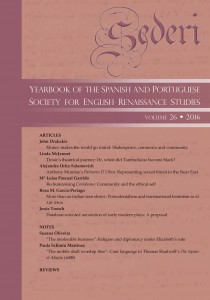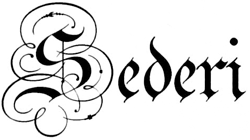
Sederi 26
Sederi 26 — 2016
EDITOR
Ana Sáez-Hidalgo
MANAGING EDITOR
Francisco J. Borge López
REVIEW EDITOR
María José Mora
ISSN 1135-7789
Rosa M. García-Periago, “More than an Indian teen shrew: Postcolonialism and feminism in Isi Life Mein.” SEDERI 26 (2016): 109–127.
DOI: https://doi.org/10.34136/sederi.2016.5 Download PDF
Abstract
This essay explores a Bollywood movie entitled Isi Life Mein (dir. Vidhi Kasliwal, 2010), which exploits The Taming of the Shrew as a play-within-the-film for the first time in Bollywood, and even as an intertext on some occasions. Although apparently a mere teen movie, this article sheds light on the importance of the Indian location, which invites postcolonial readings of the text. From a postcolonial perspective, it is the aim of this essay to rethink how The Taming of the Shrew is caught up and shaped in another culture. The film experiments with, and offers a parody of Shakespeare and his text, to the extent that they are both “reborn.” The movie also reflects on Indian modernity characterized by endless migration and diaspora. This essay equally explores the significance of using The Taming of the Shrew, since cultural debates concerning gender relations are involved. The movie adds to the multiple cultural products that rewrite the play’s ending. One of Isi Life Mein’s main attractions lies in its ability to challenge patriarchy explicitly. Interestingly, postcolonialism and feminism are intertwined in Isi Life Mein, providing new understandings of the Shrew and, ultimately, the Bard.
Keywords: Shakespeare; adaptation; The Taming of the Shrew; India; Bollywood cinema.
References
Abel, Roysten, dir. 2003. In Othello. Perf. Roysten Abel, Sheeba Chaddha, Adil Hussainand Barry John. ANB Pictures.Film.
Appadurai, Arjun. 1996. Modernity At Large: Cultural Dimensions of Globalization. Minnesota: Minnesota University Press.
Bhabha, Homi K. 1994. The Location of Culture. London and New York: Routledge.
Burnett, Mark. 2013. Shakespeare and World Cinema. Cambridge: Cambridge University Press.
Burns, Margie. 1986. “The Ending of the Shrew.” Shakespeare Studies 18: 41–64.
Burt, Richard. 2011. “All that Remains of Shakespeare in Indian Film.” In Shakespeare in Asia: Contemporary Performance, edited by Dennis Kennedy and Yong Li Lan, 73–108. Cambridge: Cambridge University Press.
Caron, Glenn Gordon, dir. 1985. Moonlighting. Perf. Bruce Willis and Cybill Shepherd. ABC Circle Films and Picturemaker Productions. TV series.
Cartmell, Deborah. 2010. “The First Adaptation of Shakespeare and the Recovery of the ‘Renaissance’ Voice: Sam Taylor’s The Taming of the Shrew.” In The English Renaissance in Popular Culture: An Age for All Time, edited by Greg Colón Semenza, 129–42. New York: Palgrave Macmillan.
Chopra, Aditya, dir. 1995. Dilwale Dulhaniya le Jayenge. Perf. Shahrukh Khan, Kajol and Amrish Puri. Yash Raj Films. Film.
Chopra, Vidhu Vinod, dir. 1994. 1942: A Love Story. Perf. Anil Kapoor, Jackie Shroff and Manisha Koirala. Vinod Chopra Productions. Film.
Cutts, E. H. 1953. “The Background of Macaulay’s Minute.” American Historical Review 58: 824–53.
Daniell, David. 2002. “The Good Marriage of Katherine and Petruchio.” In The Taming of the Shrew. Critical Essays, edited by Dana E. Aspinall, 71–84. New York and London: Routledge.
Davis, Hugh H. 2006. “I was a Teenage Classic: Literary Adaptation in Turn-of-the-Millennium Teen Films.” The Journal of American Culture 29 (1): 52–60.
Desai, Manmohan, dir. 1985. Mard. Perf. Amitabh Bachchan, Amrita Singh and Nirupa Roy. Film.
Dwyer, Rachel, and Jerry Pinto. 2011. Beyond the Boundaries of Hindi Cinema. New Delhi: Oxford University Press.
Dwyer, Rachel. 2014. “Bollywood’s Empire: Indian Cinema and The Diaspora”. In Routledge Handbook of the South Asian Diaspora, edited by Joya Chatterji and David Washbrook, 409–18. London and New York: Routledge.
Garrick, David, dir. 1754. Catherine and Petruchio: A comedy, in three acts. Play.
Gosnell, Raja, dir. 1999. Never Been Kissed. Perf. Drew Barrymore, David Arquette and Michael Vartan. Fox 2000 Pictures, Bushwood Pictures and Flower Films (II). Film.
Gulzar, dir. 1982. Angoor. Perf. Sanjeev Kumar, Moushumi Chatterjee, Deven Verma. A.R. Movies. Film.
Henderson, Diana. 2003. “A Shrew for the Times, Revisited.” In Shakespeare, the Movie II. Popularizing the Plays on Film, TV, Video, and DVD, edited by Lynda E. Boose and Richard Burt, 120–40. London and New York: Routledge.
Henderson, Diana. 2006. Collaborations with the Past: Reshaping Shakespeare Across Time and Media. Ithaca, NY: Cornell University Press.
Hodgdon, Barbara. 1992. “Katherina Bound; or, Play(K)ating the Strictures of Everyday Life.” PMLA 107 (3): 538–53.
Ivory, James, dir. 1965. Shakespeare Wallah. Perf. Jennifer Kendal, Shashi Kapoor, Felicity Kendal and Geoffrey Kendal. Merchant Ivory Productions. Film.
Jackson, Russell. 1994. “Shakespeare’s Comedies on Film.” In Shakespeare and the Moving Image, edited by Anthony Davies and Stanley Wells, 99–120. Cambridge: Cambridge University Press.
Johar, Karan, dir. 1998. Kuch Kuch Hota Hai. Perf. Shah Rukh Khan, Kajol and Rani Mukerji. Dharma Productions. Film.
Johar, Karan, dir. 2001. Kabhi Kushi Kabhie Gham. Perf. Shah Rukh Khan, Kajol and Amitabh Bachchan. Dharma Productions. Film.
Junger, Gill, dir. 1999. 10 Things I Hate About You. Perf. Julia Stiles, Heath Ledger and Joseph Gordon-Levitt. Touchstone Pictures, Mad Chance and Jaret Entertainment. Film.
Kapadia, Parmita. 2001. “The Politics of Choice: English Language Shakespeare Productions in India.” The Upstart Crow 21: 105–16.
Kaswalil, Vidhi, dir. 2010. Isi Life Mein. Perf. Akshay Oberoi, Sandeepa Dhar, Mohnish Bahl. Filmistan Studios. Film.
Khan, Mehboob, dir. 1952. Aan. Perf. Dilip Kumar and Nimmi. Mehboob Productions. Film.
Khoury, Yvette K. 2010. “The Taming of the (Arab-Islamic) Shrew: Fatin ‘Abdel Wahab Re-frames Shakespeare’s Comedy for the Egyptian Screen.” Literature/Film Quarterly 38 (2): 147–61.
Kidnie, Margaret Jane. 2006. «The Taming of the Shrew»: A Guide to the Text and Its Theatrical Life. Basingstoke: Palgrave.
Kohli, Rajkumar, dir. 1983. Naukar Biwi Ka. Perf. Agha, Rajeev Anand, Raj Babbar. Nishi Productions. Film.
Kumar, Manoj, dir. 1979. Purab Aur Pacchim. Perf. Ashok Kumar, Saira Banu, Manoj Kumar. V.I.P. Films. Film.
Madan, J.J., dir. 1932. Hathili Dulhan. Perf. Abbas, Khurshid Begum, Mukhtar Begum. Madan Theatres Ltd. Film.
Maira, Sunaina. 2013. “Citizenship and dissent: South Asian Muslim youth in the US after 9/11.” In Transnational Feminism and Global Advocacy in South Asia, edited by Gita Rajan and Jigna Desai, 39–54. London and New York: Routledge.
McLennan, Rachel. 2014. “To Count as a Girl: Misdirection in 10 Things I Hate About You.” Borrowers and Lenders The Journal of Shakespeare and Appropriation 9 (1) Accessed September 15, 2016. http://www.borrowers.uga.edu/1215/show
Nawathe, Raja, dir. 1973. Manchali. Perf. Sanjeev Kumar, Leena Chandavarkar and Nazima. Precept Enterprises. Film.
Nelson, Tim Blake, dir. 2000. O. Perf. Julia Stiles, Mekhi Phifer and Martin Sheen. Chickie the Cop, Daniel Fried Productions and FilmEngine. Film.
Pittman, Monique. 2004. “Taming 10 Things I Hate About You: Shakespeare and the Teenage Film Audience.” Literature/Film Quarterly 32 (2): 144–52.
Raj, Prayag, dir. 1975. Ponga Pandit. Perf. Randhir Kapoor, Neeta Mehta, Danny Denzongpa. Amar Chhaya Production Company. Film.
Rajashekar, M. S., dir. 1989. Nanjundi Kalyana. Perf. Raghavendra Rajkumar, Girija and Lokesh Malashri. Parvathamma Rajkumar Films. Film.
Rao, A.V. Sheshgiri, dir. 1976. Bahaddur Gandu. Perf. Arathi, Balkrishna, Rajkumar. Srikanth & Srikanth Enterprises. Bikram Singh Dahal Company. Film.
Rawail, Rahul, dir. 1983. Betaab. Perf. Shammi Kapoor, Nirupa Roy, Prem Chopra, Sunny Deol and Amrita Singh. Vijeta Films. Film.
Sharma, Rekha, and Carol A. Savery. 2014. “Bollywood Marriages: Portrayals of Matrimony in Hindi Popular Cinema.” In Heroines of Film and Television: Portrayals in Popular Culture, edited by Norma Jones, Maja Bajac-Carter and Bob Batchelor, 147–62. New York and Plymouth: Rowman & Littlefield.
Sidney, George, dir. 1953. Kiss Me Kate. Perf. Kathryn Grayson and Howard Keel. Metro-Goldwyn-Meyer. Film.
Singh, Jyotsna. 1989. “Different Shakespeares: The Bard in Colonial/Postcolonial India.” Theatre Journal 41 (4): 445–58.
Taylor, Sam, dir. 1929. The Taming of the Shrew. Perf. Mary Pickford and Douglas Fairbanks. Elton Corporation and Pickford Corporation. Film.
Thompson, Ann. 2003. “Introduction.” William Shakespere, The Taming of the Shrew, edited by Ann Thompson, 1–49. Cambridge: Cambridge University Press.
Thussu, Daya Kishan. 2008. “The Globalization of ‘Bollywood’— The Hype and Hope.” In Global Bollywood, edited by Anandam P. Kavoori and Aswin Punathambekar, 97–116. New York: New York University Press.
Trivedi, Poonam. 2007. “Filmi Shakespeare.” Literature/Film Quarterly 35 (2): 148–58.
Vanita, Ruth. 2007. “When Men and Women are Alone. Framing the Taming in India.” Shakespeare Survey 60: 84–101.
Verma, Rajiva. 2006. “Shakespeare in Hindi Cinema.” In India’s Shakespeare: Translation, Interpretation and Performance, edited by Poonam Trivedi and Dennis Bartholomeusz, 269–90. New Delhi: Pearson Longman.
Virdi, Jyotika. 2003. The Cinematic Imagination. Indian Popular Films as Social History. New Brunswick, New Jersey and London: Rutgers University Press.
Zeffirelli, Franco, dir. 1966. The Taming of the Shrew. Perf. Elizabeth Taylor and Richard Burton. Film.
